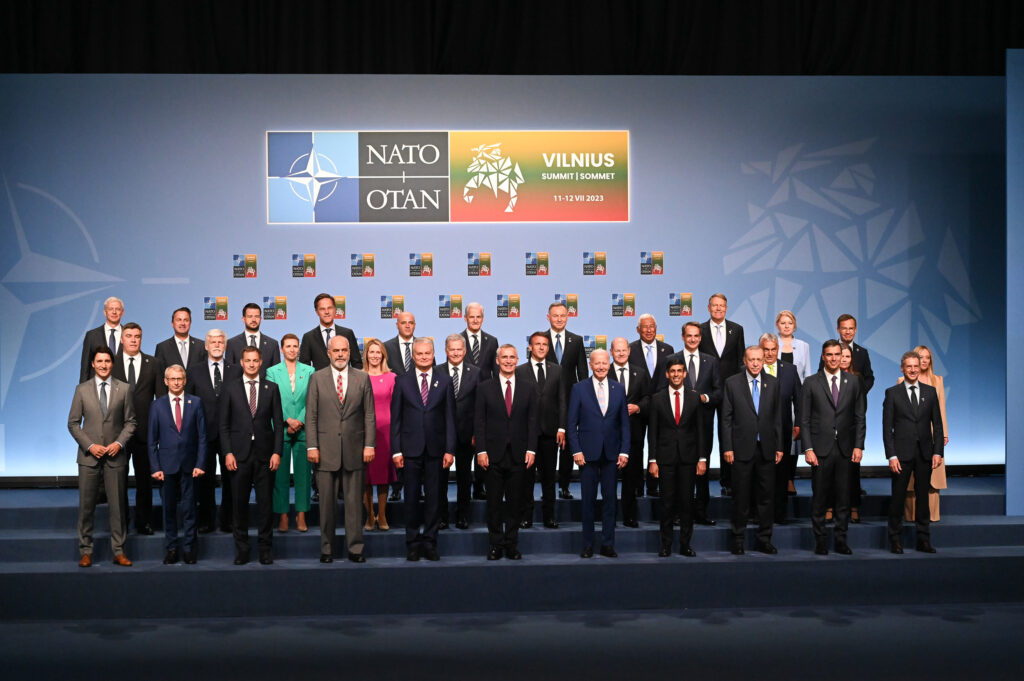
G7 and NATO Allies join forces to bolster Ukraine’s defence and pave the way for NATO membership, ensuring regional security and stability.
Image: Twitter/ @LithuaniaMFA
Here are the four key takeaways of the Vilnius summit at its conclusion after world leaders joined together in Vilnius, Lithuania.
Pedro Sanchez joins other world leaders at the NATO summit to discuss the future of the Atlantic Alliance, held this year in Lithuania, a key member of the resistance against Russia due to the USSR invasion of the Baltic States in the 1940s.
The summit was held in Vilnius, the capital of Lithuania, just a short distance from the war between Russia and Ukraine. Lithuania is no stranger to attacks from Russia, and the invasion of the Baltic States was never acknowledged by the United States. Security was increased during the NATO summit.
We will look at some of the hot topics discussed in this year’s summit.
1. Reinforcement of Spain’s commitment to Eastern Europe
The NATO Force Model in Madrid provides the Atlantic Alliance with 300,000 highly-trained soldiers available for deployment.
In addition, states like Lithuania, Romania or Slovakia are going to receive further reinforcements of troops to prevent Russia from launching further invasions such as the one that provoked the Ukraine war. Spain, a country that has been known for its consistent compliance with NATO standards, aspires to lead one of these troops.
2. Defence spending commitment
One of the contentious issues of the Alliance is the imbalance of defence spending by its allies, the majority of the financing for defence comes from the US. Since 1999’s Washington summit, NATO has tried to increase European military spending to sustain NATO militarily and economically. The initial pledge of a minimum of three per cent of a country’s GDP towards military spending was unfulfilled, 90 per cent of the allies could not meet this figure.
In 2014, at the Wales summit, a minimum of two per cent of the GDP was reached as a minimum target. However, only 11 of the 31 members were able to achieve this figure this year. Except for the US and the UK, allies such as Poland, Greece, Estonia, Lithuania, Romania, Hungary, Latvia and Slovakia are not wealthy countries and are unable to achieve this requirement.
Spain has pledged to increase its spending and military support of NATO, especially in the context of the Ukraine – Russia war.
3. New members
The Madrid summit was a historic event, having achieved the conversion of Sweden and Finland from neutral countries to Atlantic Allies. Finland became a member of NATO, after Turkey and Hungary vetoed its incorporation into the alliance. Sweden’s integration into NATO was complicated, as Erdoğan, Turkey’s president, pushed hard to prevent the Scandinavian country from becoming NATO’s 32nd state.
Three potential NATO members were under discussion: Bosnia, Georgia and Ukraine. Bosnia presents a challenge since the multinational Bosnian state makes it an unfeasible addition. If NATO were to admit Bosnia, Moscow would have a say and Bosnia could represent the interest of the Kremlin in Brussels. This fact is what has become known as the Moscow-Belgrade-Banja Luka axis.
Georgia, a country that could be a favourable addition to the alliance, is currently close to the Kremlin and could present conflictive interests.
Finally, Ukraine’s membership remains controversial due to the current war with Russia.
4. Ukraine
One of the most anticipated points of the summit was NATO’s decision on whether Ukraine can become a NATO member. Although President Zelensky has been very critical of the alliance in the past, Ukraine becoming a member of NATO is conditional on their victory in the war. NATO is willing to admit Ukraine into NATO, but it will not occur while the country is at war. Admitting Ukraine now would involve NATO in a direct war against Russia.
Meanwhile, Ukraine will have a privileged relationship with NATO and receive military support and training for its troops, and a NATO-Ukraine Council has been created where Kiev will have a voice like any other member state, although they will not have a vote.
The Vilnius summit will go down in history for being a transition summit, where the decisions adopted in Madrid will begin to be implemented and, above all, because NATO raised a barrier to Ukraine’s integration into the Alliance.
Stay connected with us on social media platform for instant update click here to join our Twitter, & Facebook
We are now on Telegram. Click here to join our channel (@TechiUpdate) and stay updated with the latest Technology headlines.
For all the latest World News Click Here

